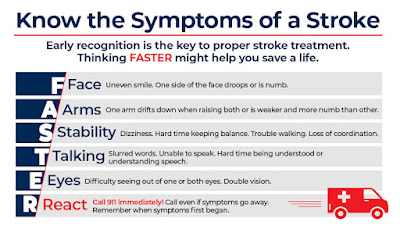American Stroke Association (a Division of the American Heart Association) site shows that May is American Stroke Month. I think I would prefer Stroke Awareness Month. :-)
A stroke is a medical emergency that occurs when the blood supply to part of the brain is interrupted. This can damage brain cells and lead to a variety of symptoms, including:
- Sudden numbness or weakness in the face, arm, or leg, especially on one side of the body
- Sudden confusion, trouble speaking or understanding speech
- Sudden trouble seeing in one or both eyes
- Sudden trouble walking, dizziness, loss of balance or coordination
- Sudden, severe headache with no known cause
I like this acronym as it is shorter and simpler than some, which can be easier for people to remember as well.
Just be aware, there are others that have since come along are F.A.S.T.E.R. and B.E.F.A.S.T
Just be aware, there are others that have since come along are F.A.S.T.E.R. and B.E.F.A.S.T
F.A.S.T.E.R.
F - Face drooping: Ask the person to smile. Is one side of the face drooping?
A - Arm weakness: Is one arm weak or numb?
S - Speech difficulty: Is speech slurred or garbled?
T - Time: If you notice any of these symptoms, call 911 immediately (for those in U.S.). Time is brain, and the sooner someone with a stroke receives treatment, the better their chances of recovery.
E- Eyes: - Refers to visual changes. These visual changes occur suddenly and can include complete vision loss in one eye, double vision, and partial loss of vision in one or both eyes.
B.E.F.A.S.T.
B - Balance: The person may suddenly have trouble with balance or coordination.
E - Eyes: They could experience sudden blurred, double or total loss of vision. This can happen in one or both eyes.
F - Face: Do you notice one side of their face drooping? Ask the person to smile.
T - Time: If you notice any of these symptoms, call 911 immediately (for those in U.S.). Time is brain, and the sooner someone with a stroke receives treatment, the better their chances of recovery.
E- Eyes: - Refers to visual changes. These visual changes occur suddenly and can include complete vision loss in one eye, double vision, and partial loss of vision in one or both eyes.
Additional Symptoms
In addition to the symptoms listed above, there are a number of other symptoms that can be associated with a stroke. These include:
- Sudden trouble swallowing
- Sudden trouble with balance or coordination
- Sudden severe headache with no known cause
- Nausea or vomiting
- Dizziness
- Loss of consciousness
If you experience any of these symptoms, it is important to seek medical attention immediately.
Treatment for a Stroke
The treatment for a stroke depends on the type of stroke. If the stroke is caused by a blood clot, a medication called tissue plasminogen activator (tPA) can be used to dissolve the clot. tPA must be given within 4.5 hours of the start of the stroke, so it is important to seek medical attention as soon as possible.
If the stroke is caused by a bleed in the brain, surgery may be necessary to stop the bleeding.
Recovery from a Stroke
The recovery from a stroke can vary depending on the severity of the stroke and the person's overall health. Some people make a full recovery, while others may have long-term disabilities.
There are a number of things that people can do to improve their chances of a good recovery from a stroke. These include:
- Participating in rehabilitation therapy
- Making lifestyle changes, such as quitting smoking, eating a healthy diet, and exercising regularly
- Getting regular medical checkups
Preventing a Stroke
There are a number of things that people can do to reduce their risk of having a stroke. These include:
- Controlling high blood pressure
- Controlling cholesterol levels
- Controlling blood sugar levels
- Quitting smoking
- Eating a healthy diet
- Exercising regularly
- Reducing stress
If you have any questions or concerns about stroke, please talk to your doctor or if urgent situation arises call 911 (if in U.S.)
Source: Conversation with Bard
#bard #stroke #signsofstroke #FAST






No comments:
Post a Comment